KJU Inspects KPA Unit #1524 and Sindo County NPY
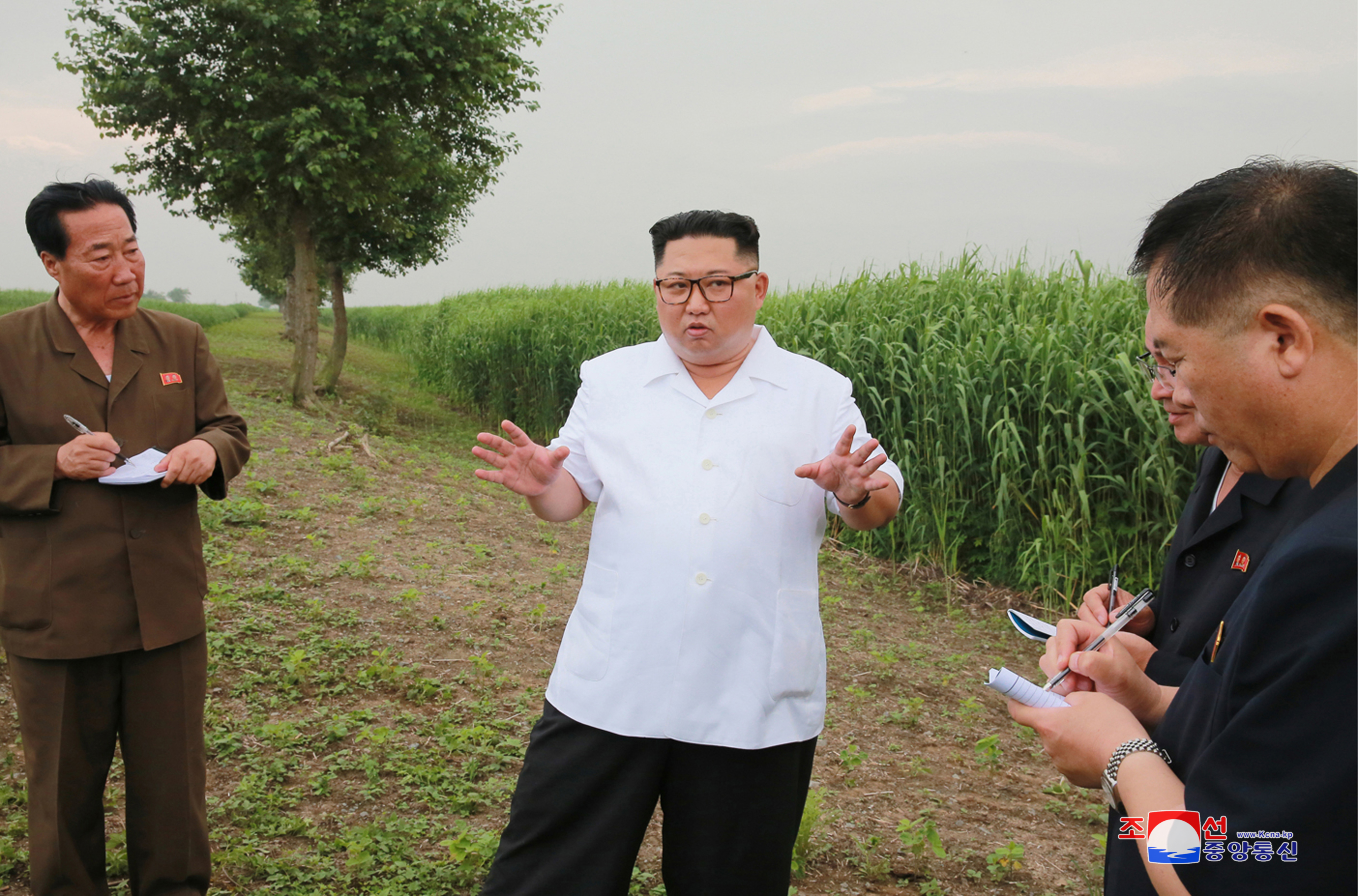
Kim Jong Un issues instructions during a visit to Sindo County, North P’yo’ngan Province (Photo: Rodong Sinmun).
KJU’s last observed appearance was arrival from his visit to the PRC
DPRK state media reported on June 30 (Saturday) that Kim Jong Un (Kim Cho’ng-u’n) visited Sindo County, North P’yo’ngan Province and conducted a field inspection of Korean People’s Army (KPA) Unit #1524.
His first visit was to Field #14 of Reed Branch Farm #1 which is under the Sindo County Combined Reed Farm (several reed farms consolidated into one production unit). Also in attendance were Personal Secretariat (Office Director of the Chairman of the State Affairs Commission of the DPRK) Chief Kim Chang Son (Kim Ch’ang-son), Workers’ Party of Korea (WPK) Organization Guidance Department Senior Deputy Director Hwang Pyong So (Hwang Pyo’ng-so’), WPK Economic Affairs Department Director Han Kwang Sang (Han Kwang-sang), WPK International Affairs Department Deputy Director Kim Song Nam (Kim So’ng-nam) and Personal Secretariat Deputy Chief and WPK Organization Guidance Department Deputy Director Jo Yong Won (Cho Yo’ng-wo’n). The farm had previously been visited by late DPRK President and founder Kim Il Sung (Kim Il-so’ng) and late DPRK leader Kim Jong Il (Kim Cho’ng-il).
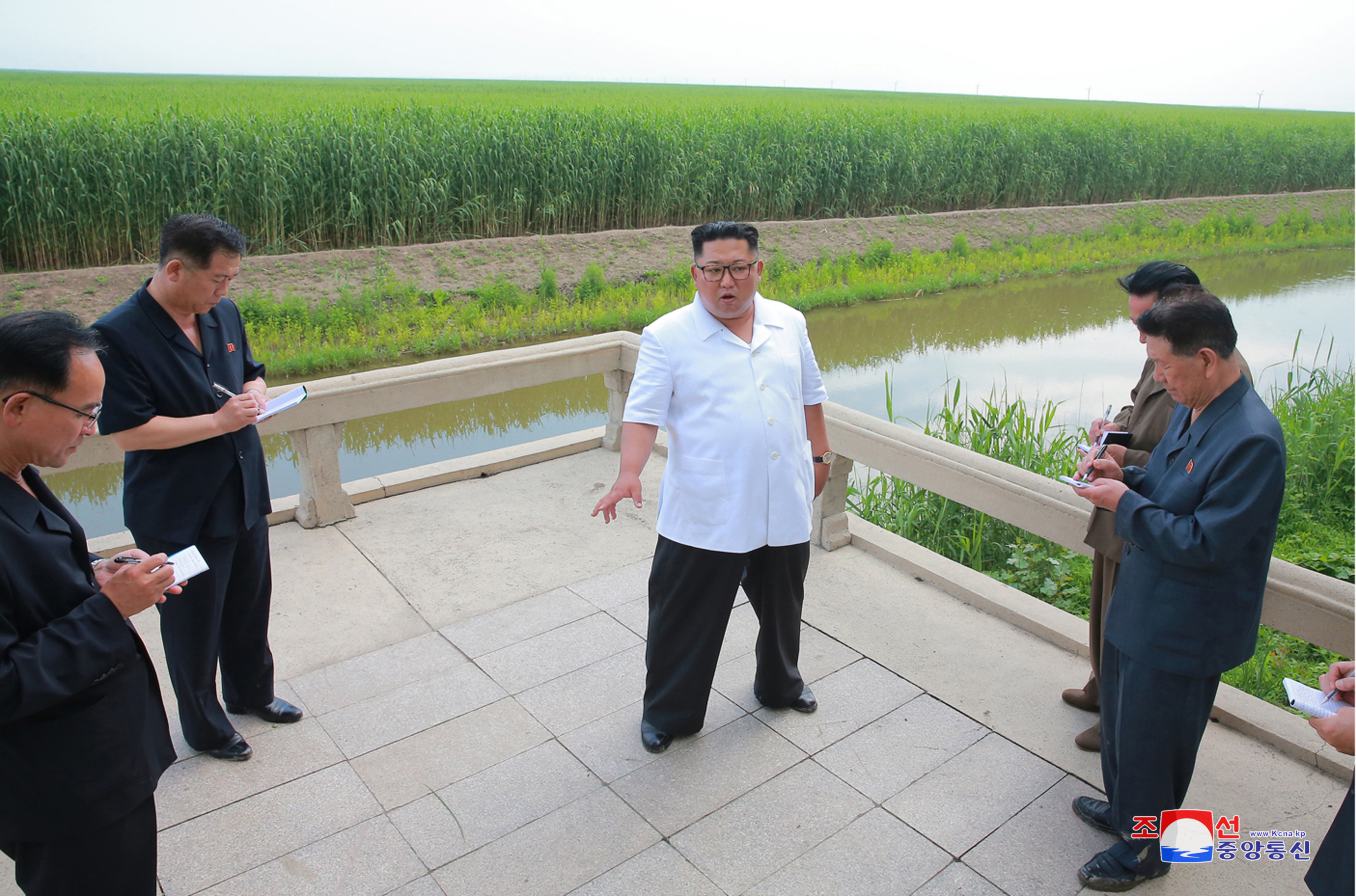
Kim Jong Talks with senior WPK officials during his visit to Sindo Country. On the right is Hwang Pyong So (Photo: KCNA).
Jong Un remarked that “if the production of chemical fibers based on reeds is to be reenergized then it is necessary to spruce up Sindo County as befitting a large scale reed production base, put the reed cultivation on a scientific and modern basis so as to increase the per hectare yield of it and settle the reed transportation issued in order supply enough fiber materials to factories.” He noted that to “turn the country into a reliable Chuch’e-based chemical fiber materials base and increase the reed production is important work for further strengthening the independence of the country’s chemical industry.”
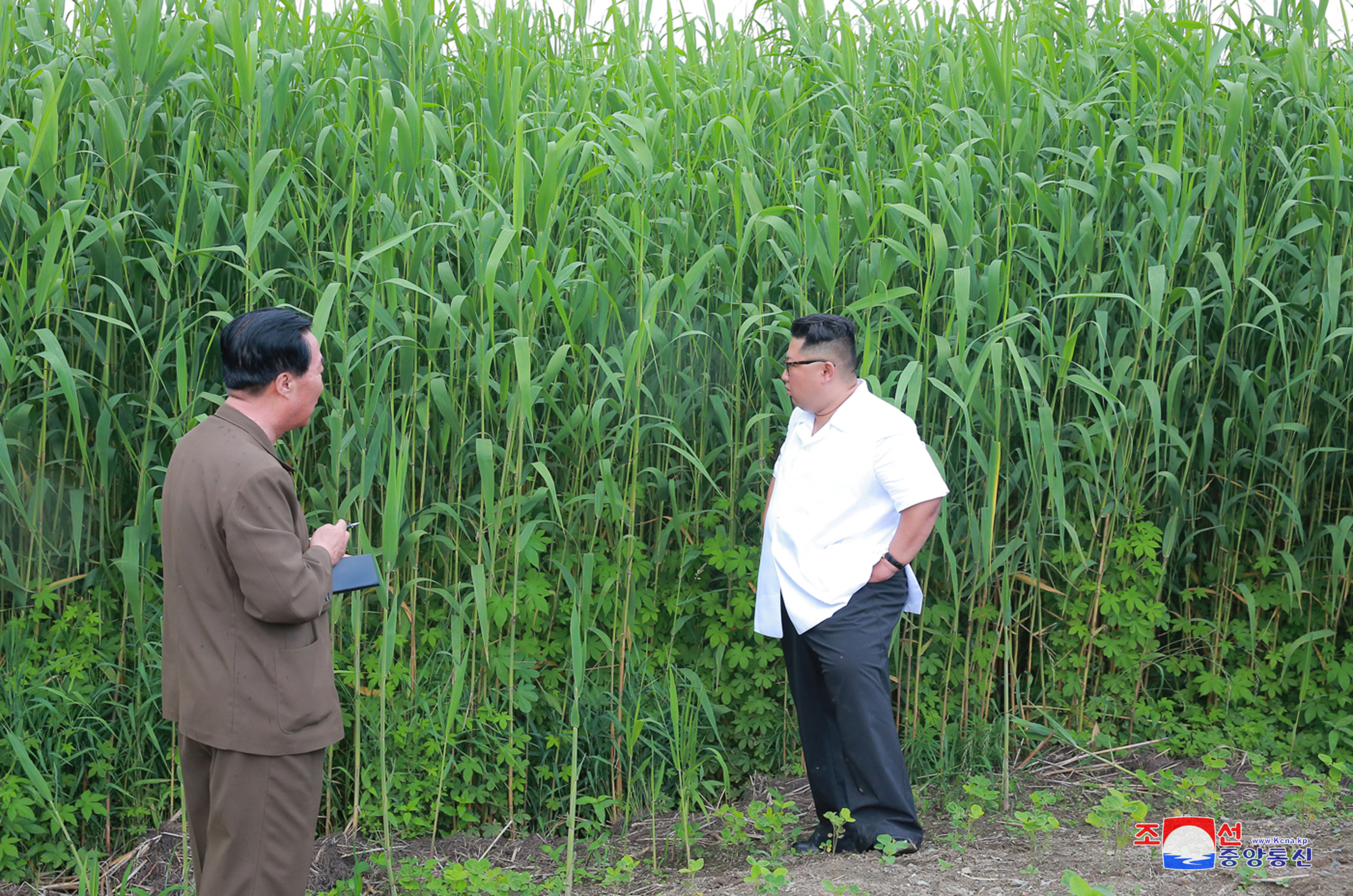
Kim Jong Un looks at reeds grown in Sindo County, North P’yo’ngan (Photo: Rodong Sinmun)
Kim Jong Un said that he “would positively help it and called for raising good reeds to keep its production going at the rate of the peak year and continuing the reap the rich harvest in the future” and then he issued “detailed tasks and ways for bringing about a fresh turn in the reed cultivation.”
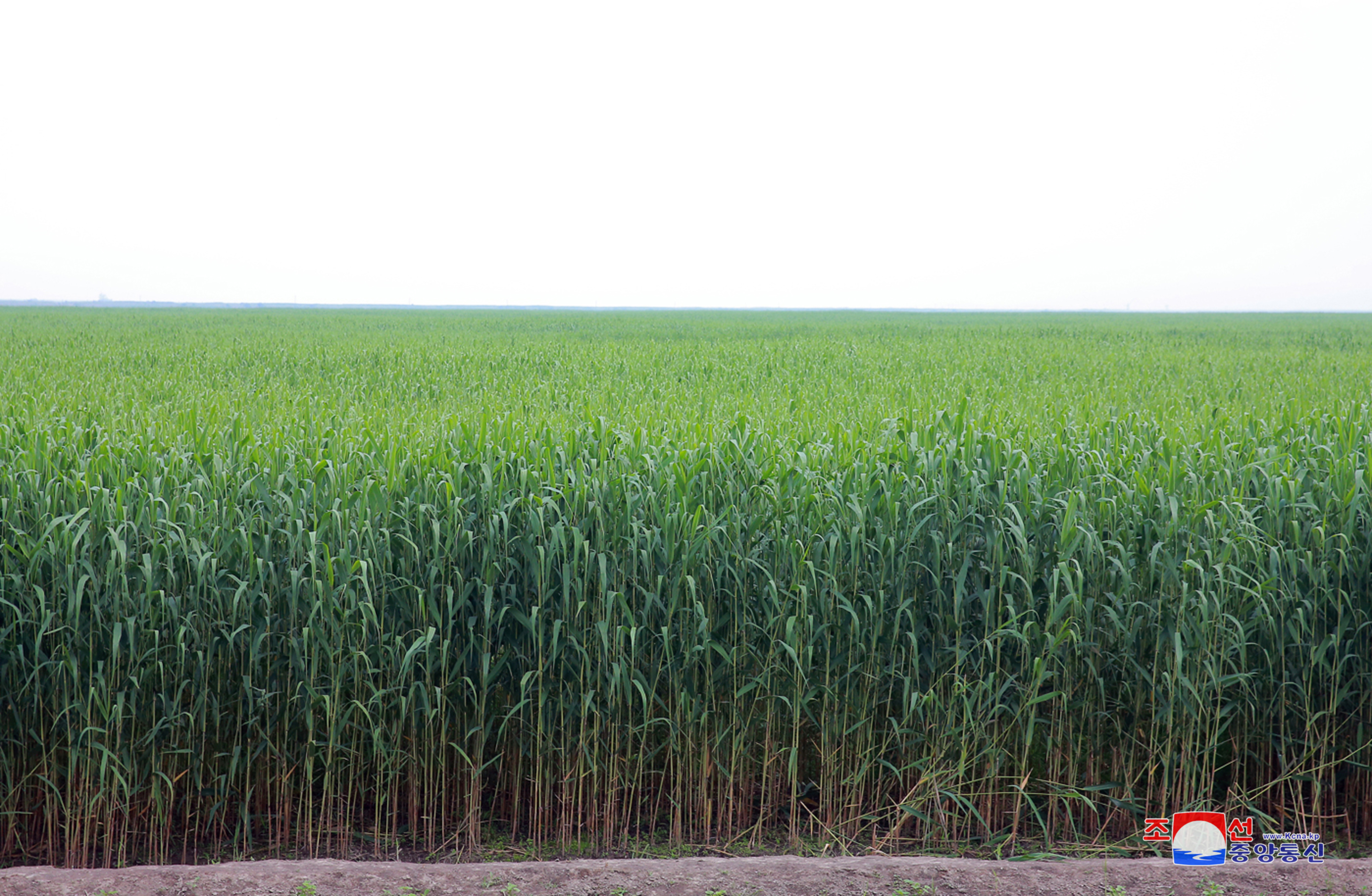
(Photo: KCNA/Rodong Sinmun).
He remarked that he “would send high-powered tractors and other vehicles to the country” and then “assigned the relevant sector to tasks to preferentially provide the country with fuel oil, tires and vehicle accessories.” He said that he would “learn about the conditions of generating and pumping equipment and tugs and lighters,” then “take steps to maintain them and work out to provide new ones and help it in a responsible manner.” Kim Jong Un then tours the Reed Branch Farm #1’s mechanized work team.
During this part of his visit, he called “for using farm machines and implements with care and taking good care of them in a responsible way and repairing and maintain them in time and making effective use of them by enhancing the responsibility and role of the users and thus positively mechanizing all the farming processes.” After learning about Sindo Country, Jong Un issued “highly important tasks facing the county.”
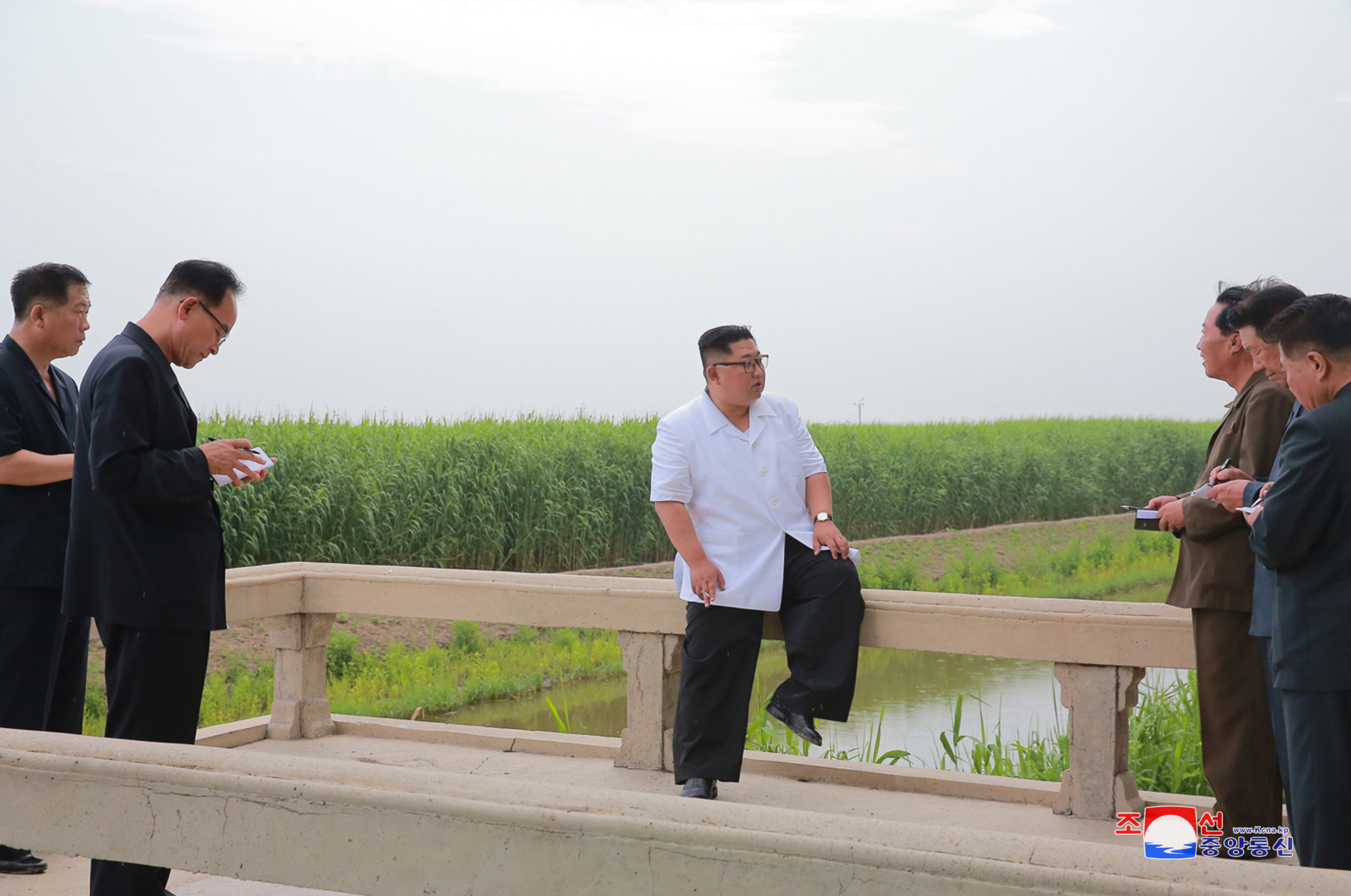
Kim Jong Un leans against a bridge whilst inspecting a reed farm in North P’yo’ngan (Photo: KCNA).
He said that it “is important for the remote island to lay a reliable supply service foundation for it” and “underlined the need to increase the grain production and reenergize the stockbreeding and fishing bases so as to turn the county into the one with mighty means of living that can produce and supply all things necessary for its economic life independently.” He stressed “the need to build up the county’s people’s hospital on a modern basis like a big one in a city in order to cure patients by itself” and said that “the hospital should be provided with complete sets of medical equipment to perform most operations.”
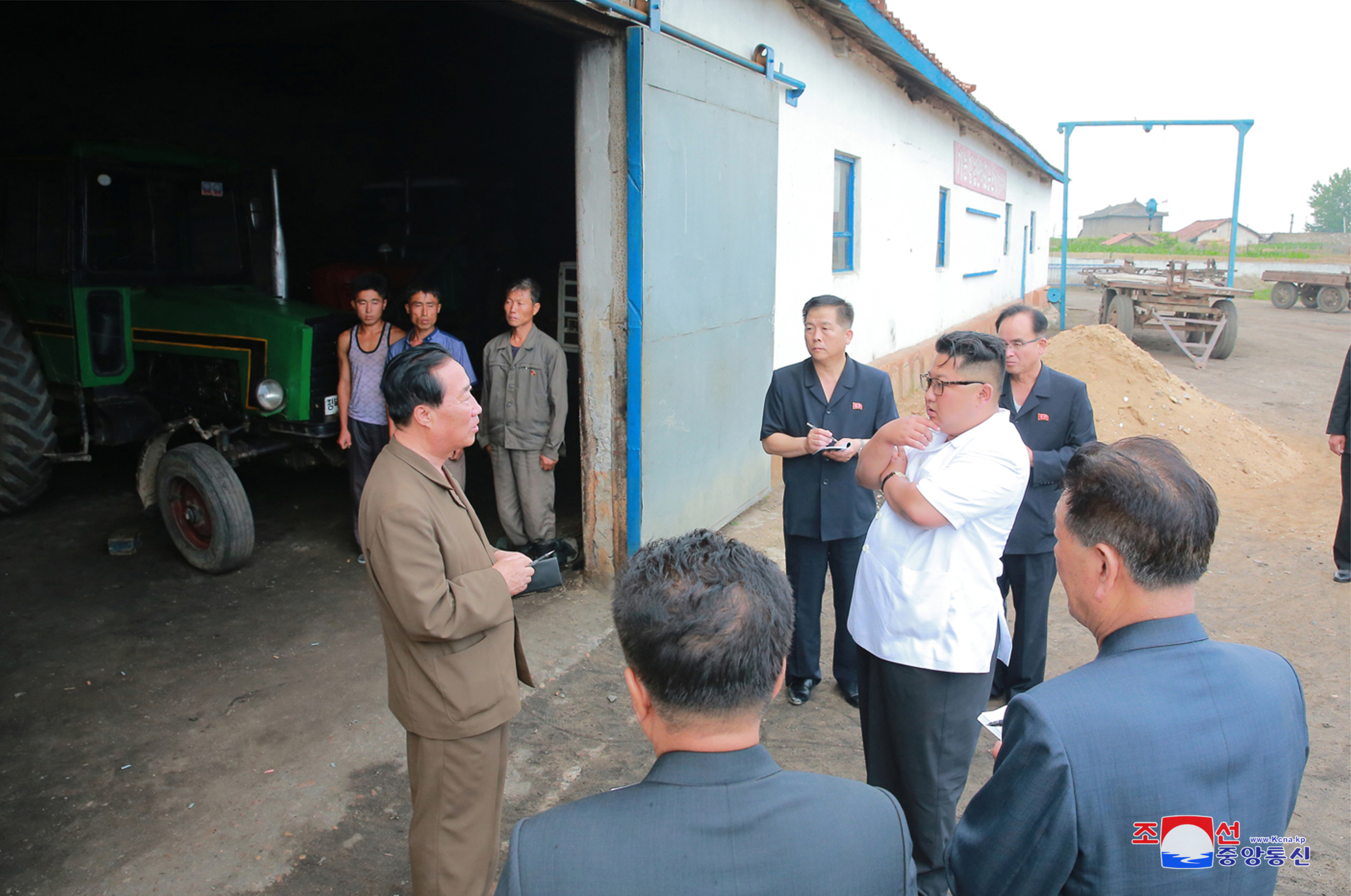
Kim Jong Un is briefed about the use and maintenance of farm equipment (Photo: Rodong Sinmun).
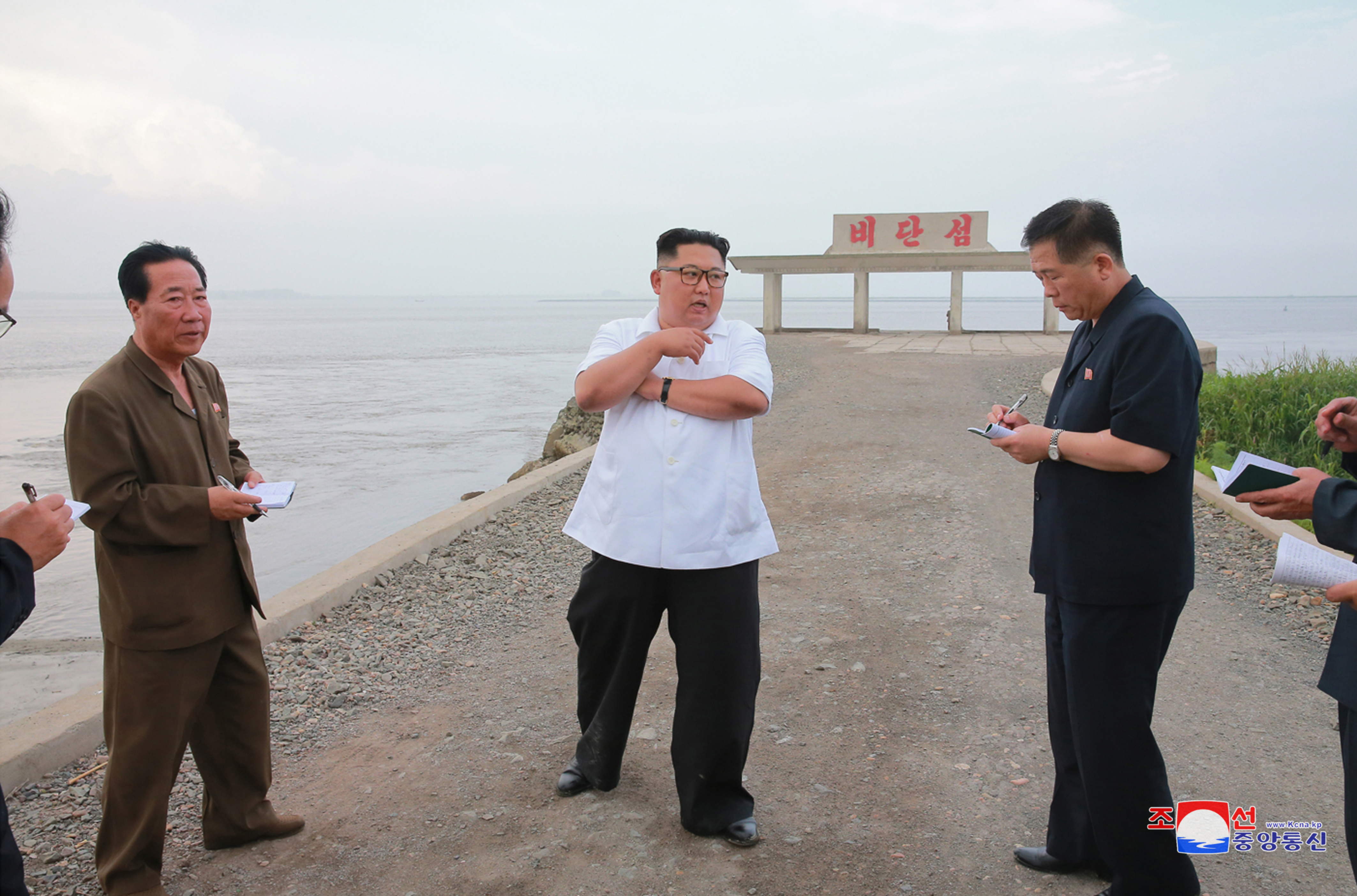
Kim Jong Un in Sindo County (Photo: Rodong Sinmun).
Jong Un also said that “it is also needed to spruce up primary and middle schools in the county and remarkably improve the educational environment and conditions so that the inhabitants in the island can lead a highly civilized life like those on a city.” He ensured that the “powerful building force of the People’s Army is mobilized to rebuild the people’s hospital and schools in the county into model and standard units in the public health and educational fields.” To that effect, Kim Jong Un “on the spot took measures to provide the necessary materials. Working heart and soul to provide the inhabitants in the island country with more convenient and civilized living conditions, he promised to send buses and other vehicles in consideration of their traffic conditions.”
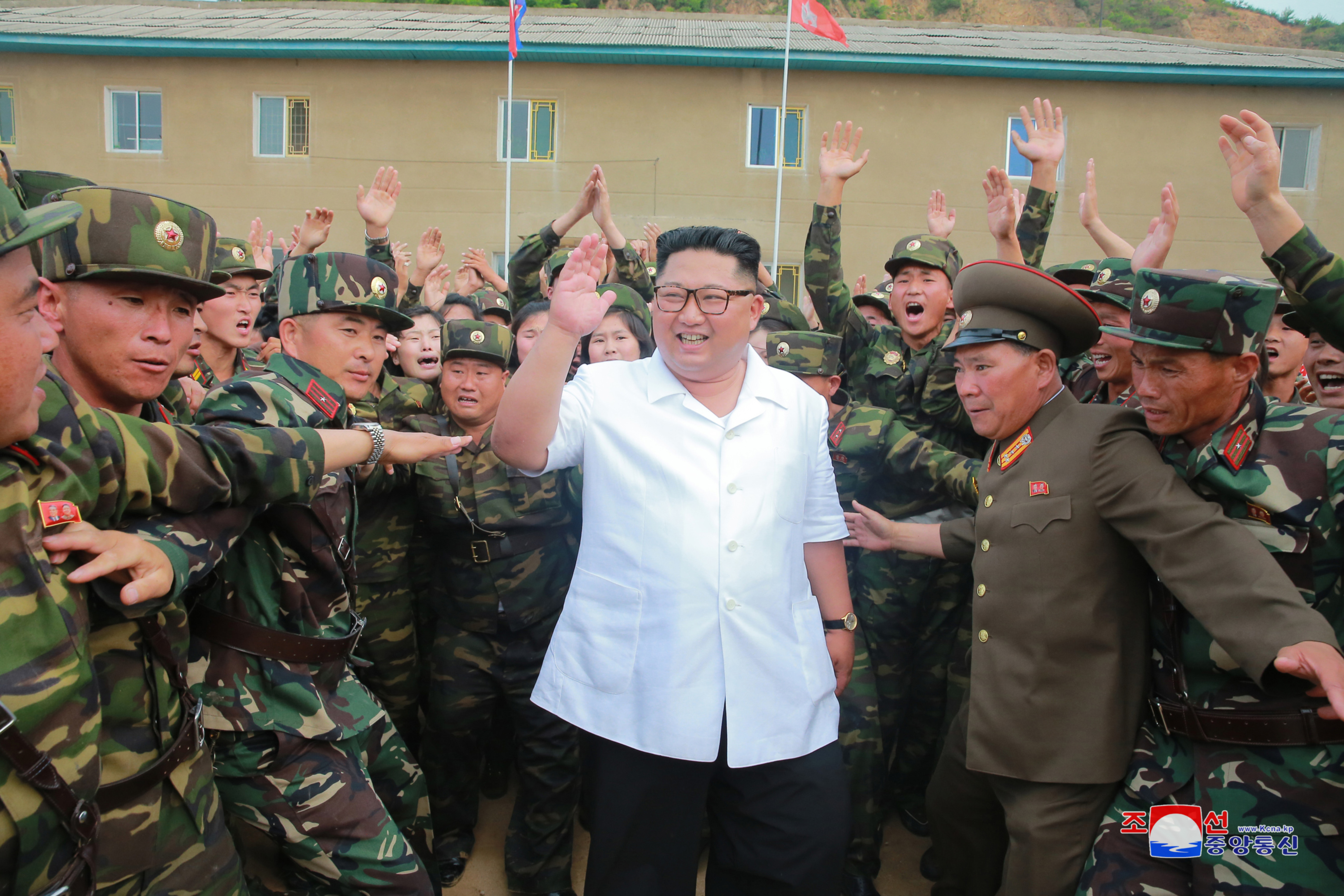
Kim Jong Un responds to the cheers of officers and service members of KPA Unit #1524 (Photo: Rodong Sinmun).
Prior to visiting Sindo County, Kim Jong Un conducted a field inspection of KPA Unit #1524, a component unit of the VIII Army Corps. Also in attendance were Kim Chang Son, Hwang Pyong So, Han Kwang Sang and Jo Yong Won. He received a salute from the command stuff, then toured the political education room, the barracks, the baths, a soybean warehouse, a greenhouse and other locales of the unit so as to “take warm care of the living soldiers like their own parents would do.” At the political education room Jong Un “acquainted himself in detail with the education of soldiers of the unit and stressed the need to intensify political and ideological education and the education of faith in conformity with the specific character of the duty of the unit defending the outpost line of the socialist country and thus reliably defend the post and carry on service with the steadfast class stand.”
Kim Jong Un was briefed about KPA Unit #1524’s soybean farming and he “told officers to increase the per-hectare soybean yield by positively introducing the successes and experiences of advanced units.” He said “it is necessary to pay deep attention to providing good bean processing equipment for combat units in remote areas like this unit so that the servicepersons can eat various bean dishes.”
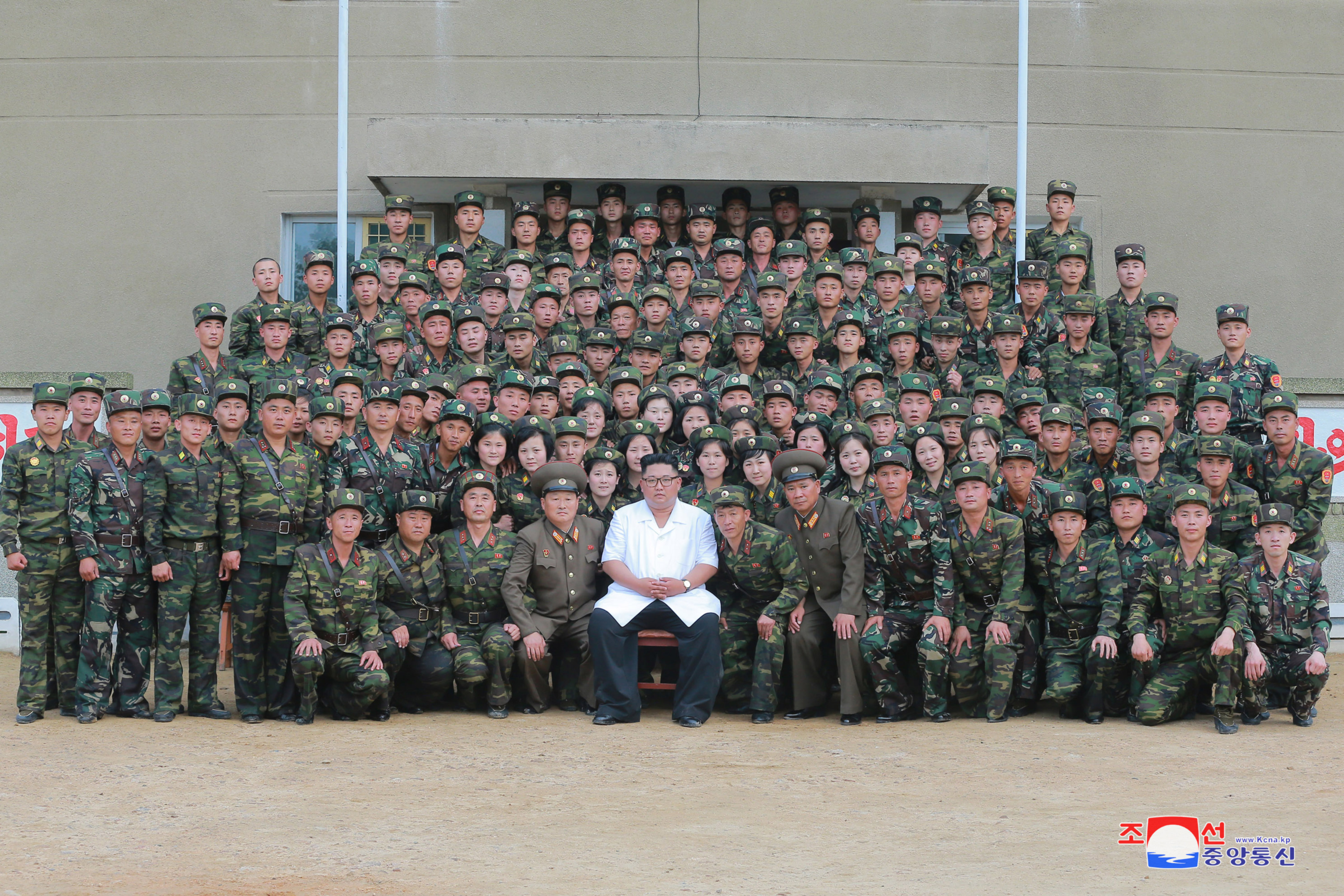
Kim Jong Un poses for a commemorative photo with commanders, officers and service members of KPA Unit #1524 (Photo: Rodong Sinmun).
He toured the greenhouse and stressed the “need for the unit to plant and introduce around the barracks the high yielding crops and vegetables of good species that have been cultivates by Farm #1116 of KPA Unit #810 so that it may benefit from them.” He was “satisfied with the fact that unit settled the cooking fuel issue with methane gas and has improved the servicepersons’ diet with a good supply foundation.” Kim Jong Un “repeatedly underscored the need to push forward with the work for laying living foundations so that the soldiers can devote themselves to military service without any inconvenience.”
Prior to a commemorative photo sessions with service members and officers of the unit, he “expressed the expectation and belief that the servicepersons of the unit would creditably discharge their mission and role as frontline soldiers defending the gate to the socialist country with the red arms of revolution in their hands.